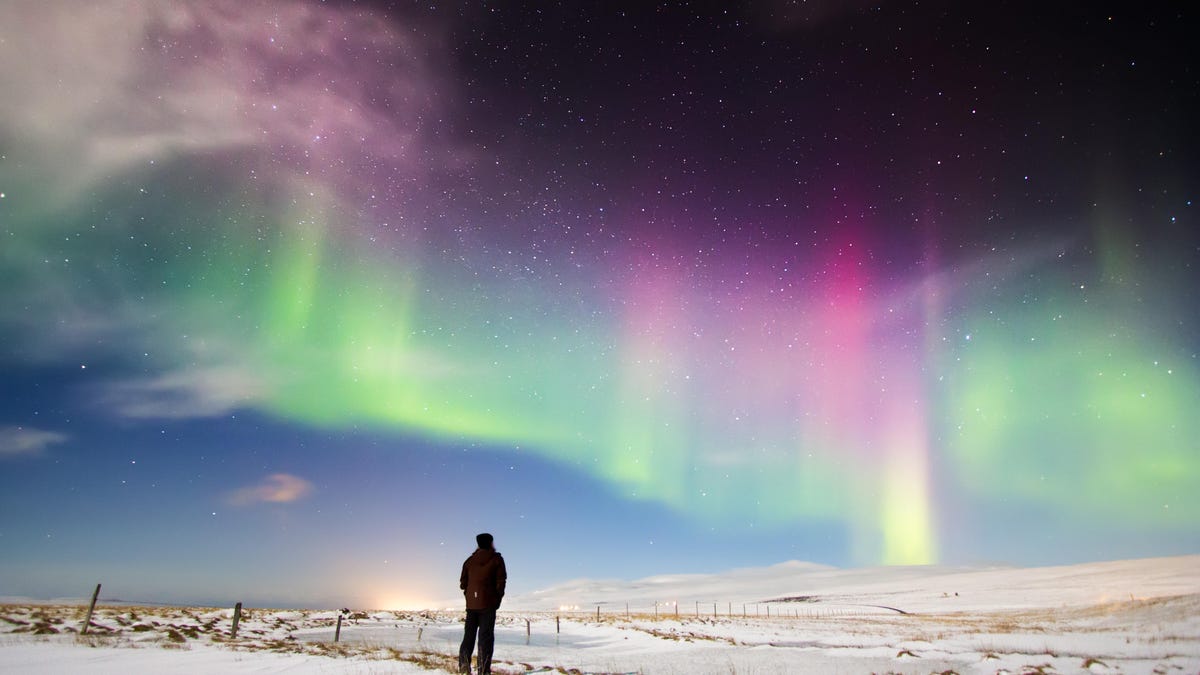Why Can I Never See the Northern Lights From Where I Live?
There's hope -- if you can wait till 2024.

Man watching aurora borealis in north Iceland.
You know the drill: Buzzy articles claim that the Northern Lights, the dazzling phenomenon known scientifically as the aurora borealis, might be able to be seen in regions that don't normally get to see them. People who've been raised on photographs of spectacular views such as these begin dreaming, maybe set an alarm to head outside late at night, maybe drive outside of their city limits to try and avoid light pollution.
The latest news from the National Oceanic and Atmospheric Administration looks so positive. A geomagnetic storm is expected to peak Thursday at what's called a G3 level. That's good but not great for aurora spotting -- G5 is the highest. While the aurora lights are usually seen only in very northern locations, there's some hope this storm could push them further south, and even states such as Oregon or Pennsylvania might get a glimpse.
Oh NOAA, why do you keep breaking our hearts with hope we'll see an aurora?
But so often, as I wrote about in 2020 when there were high hopes for aurora sightings, the forecast changes, the Northern Lights get shy and people are disappointed. Is this all a spacey scam?
Bill Murtagh, program coordinator at NOAA's Space Weather Prediction Center, is well aware that many of us would-be aurora spotters get bummed out, over and over.
Seems fishy to me
Murtagh compared it to a conversation he recently had with someone who fishes for marlin, saying he asked them how many hours they spent out on the water hoping for their big catch, versus how many times they really succeed.
"(Fishing) is like (looking for) an aurora," Murtagh told me. "You might be out hunting it for hours on end, and then, the perfect storm of events comes along, and you finally see it."
City disadvantage
If you live in a city -- Murtagh was talking to me from Boulder, Colorado, while I'm in Seattle -- you're already at a disadvantage.
"I've had people say, 'I went looking for (the aurora), and I didn't see anything!'" Murtagh told me. "And I say, 'Well, where were you?' And they say, 'Downtown Denver.' Ah, well, there's this thing called light pollution..."
Light pollution is pretty much exactly what it sounds like, the brightening of the night sky in the city, caused by streetlights and other sources. That inhibits our ability to see stars and planets.
Cloud cover can be a problem
But say you get in the car and drive out of your city or suburb to a rural area with no streetlights. There's an element that's out of your control -- the weather.
"If you've got a Washington state-kind of [weather pattern], good luck," Murtagh said with a laugh, referring to my state's famous cloudiness. And clouds can roll over any state at any time, making aurora sightings even tougher to predict.
Want to try anyway?
And when, exactly, should you venture out to go aurora-spotting? Wouldn't it be nice if we could be given a prime block of time when the aurora is most likely to show up? Murtagh said that's not realistic. You want it to be dark, but that's about as specific as predictions can get.
"There's really no specific time [that's best]," he told me. "Don't let anyone tell you, 'This time or that time is when you'll see it.'"
Aurora tourism
If seeing the aurora is on your bucket list, and you have a bucket full of travel money, consider a trip to Alaska or northern Canada, or even northern Europe.
"Anchorage, Fairbanks, Yukon, Helsinki, northern Scandinavia, those are the spots where you have a good chance to see (auroras)," Murtagh said.
There are even trip planners now who organize tours around hoping to see the aurora.
"Aurora tourism is a big business now," Murtagh says.
Is it worth it?
So since seeing an aurora remains difficult, why do so many of us long to see them? Take another look at some of those magnificent photos and you might be reminded.
"They're just so majestic," Murtagh said. "To see the sky waving in shades of green and yellow, sometimes red and purple. It's sometimes frightening to see it. Anyone who is lucky enough to see it in all their glory knows."
Don't lose faith
Murtagh offered me, and other city dwellers, a bit of hope. If we'd talked about aurora hunting every month from 2018 to 2020, there'd have been almost no news to report, he said, because the sun was experiencing solar minimum, the regular period of its 11-year solar cycle where there's hardly any solar activity, such as sunspots and solar flares.
But that period is wrapping up, and a solar maximum will take place from about 2024 to 2025.
"There will be more chances," Murtagh said. "And more false alarms, too!"

